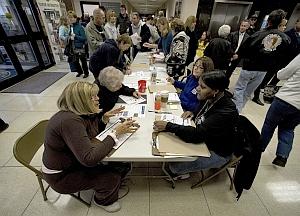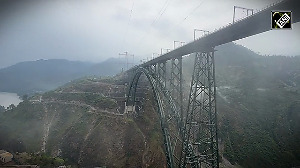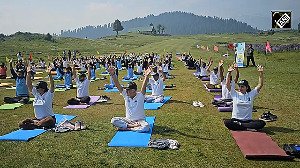 A day before the United States presidential elections, officials in New York and New Jersey, the two worst hit states by hurricane Sandy, were scrambling to put in place alternate voting sites to enable millions disrupted by the storm to cast their ballot.
A day before the United States presidential elections, officials in New York and New Jersey, the two worst hit states by hurricane Sandy, were scrambling to put in place alternate voting sites to enable millions disrupted by the storm to cast their ballot.
City Mayor Michael Bloomberg said election officials were grappling with 'real problems' amid continued power outages, a partially restored public transport system and freezing temperatures that made voting the last of the concerns of residents impacted by Sandy.
Due to the damage caused to polling stations in the wake of Sandy, thousands of registered voters in New York will be forced to go to polling sites different from the one they had been assigned to, Bloomberg said.
Local elections officials are having 'real problems and we have got to make sure that everybody can vote,' Bloomberg told reporters on Sunday.
"The board of elections tells us that about 143,000 voters in all five boroughs will be assigned to poll sites different from their usual site. Our NYC Service volunteers are letting many New Yorkers know about their temporary polling places," he said, adding that it is going to be critical that the board of elections communicates the new polling arrangements to their poll workers.
The city has identified alternative sites for those polling stations that have been rendered unoperational due to the storm.
A total of over 60 alternate sites have been identified, including three in Manhattan, three in the Bronx, two on Staten Island, 28 in Queens and 25 in Brooklyn.
Bloomberg was critical of the board of elections' preparedness in the past saying officials would have to 'work hard to make sure that poll workers and voters know where they're supposed to go on the election day'.
Officials across the region are taking unprecedented steps to ensure residents are able to cast their vote on the November 6 election, which promises to be a close race between President Barack Obama and his Republican rival Mitt Romney.
In states such as New Jersey, where the massive storm made landfall and caused significant damage, military trucks will be deployed to serve as polling stations.
"In places where the polling stations have been damaged, voters will find a department of defence truck with a well-situated National Guardsman and a big sign saying, 'Vote Here'.
"There is no reason not to vote," New Jersey's Secretary of State, Lieutenant Governor Kim Guadagno, who is responsible for overseeing the division of elections, said.
The New Jersey Department of State directed county elections officials to permit registered voters displaced by Sandy to vote electronically.
"This has been an extraordinary storm that has created unthinkable destruction across our state and we know many people have questions about how and where to cast their vote in Tuesday's election," Guadagno said.
"To help alleviate pressure on polling places, we encourage voters to either use electronic voting or the extended hours at county offices to cast their vote," he added.
In order to vote electronically, displaced voters would be able to submit a mail-in ballot application either by e-mail or fax to their county clerk.
Once an application is approved, the clerk would electronically send a ballot to the voter by either fax or e-mail and voters must return their electronic ballot by fax or email by the night of November 6.
Separate directives have been issued to enable displaced voters and first responders to vote by provisional ballot at a polling place in a county other than the voter's county of registration.
The deadline for county clerks to receive mail-in ballots has been extended to November 19. As the region limps towards recovery from the devastation caused by Sandy, the already harrowed residents had to cope up with freezing temperatures.
With millions still without power, officials were scrambling to set up heating shelters and passing out blankets to residents.
According to data from power utility companies, more than 1.5 million customers were still without power with over 900,000 of those outages in New Jersey and about half a million in New York.
Bloomberg said as the recovery process continues, a big challenge would be to provide heat to residents as they brace for fall in temperatures over the next few days.
"One of the great fears we have is with cold weather coming, we have to make sure that people can stay warm. Among hardest hit are the Rockaways and Staten Island areas, a lot of places that don't have electricity but are going to experience the cold. That is the next big problem for us. "It's cold outside, and it's going to remain cold for the next several days so it's critical that people keep warm," Bloomberg said, adding that shelters have been set up across the city for those who still do not have power and blankets are being distributed to the those in need.
Picture: Ocean County Administration employees help voters complete a vote by mail form in Tuesday's general election as residents continue to clean up after Hurricane Sandy in Toms River, New Jersey
Photographer: Steve Nesius/Reuters









